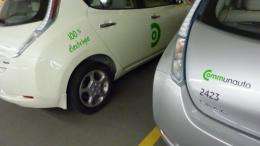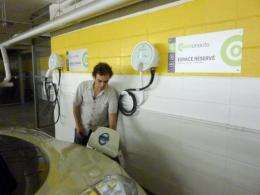Car-sharing introducing Canadians to electric vehicles

In a Montreal parking lot, Jean-Francois Beauchamp unhooks a power cable from his loaner car and cheerfully drives away, an enthusiastic user of a new service that is finding fans in equal measure among commuters and environmentalists.
"It's very quiet, pleasant and and doesn't use gasoline," says Beauchamp, 44, a web designer and frequent user of the electric cars made available for hourly rental by the Communauto car-sharing enterprise.
His loaner vehicle is one from a fleet of gasoline-free cars pointing the way forward for the increasingly popular car-share industry, which unlike a traditional car rental, allows customer to hire a vehicle for part of one day.
The Montreal-based Communauto, the oldest car-sharing company in North America, in mid-August launched the pilot project with 50 Nissan Leaf vehicles, hoping to become an industry leader of the electric loaner cars.
Communauto also is a bargain, charging about two dollars (1.50 euro) per hour, which includes the cost of fuel, plus a subscription fee.
Electric cars early on met with consumer resistance, but the chance to try out the vehicles in a low-risk car-share has helped to greatly increase their popularity.
"Ialready have a car, but I subscribed to Communauto precisely because I wanted to try out an electric car," said new convert Georges Charlebois.
Charlebois now dreams of when he'll no longer have to to rent one by the day or by the hour. That day may be a long way off, however: there is a waiting list for the vehicles at his local dealership.
The most ambitious electric car-sharing plan is wildly popular, but has a downside, Beauchamp admitted.
"You have to plan ahead because you can't stop at a gas station to fill it up," he said ruefully.
Communauto has tried to alleviate that problem, installing -- in partnership with the giant public utility Hydro-Quebec -- car charging stations in parking lots all across Montreal.
Devoid of a conventional combustion engine, the loaner cars -- emblazoned with the slogan "100% electric" -- are famously quiet, so not only do they not increase air pollution, but they don't add to the city's noise pollution, either.
Most of the electric cars can go about 140 kilometers (about 87 miles) before needing to be recharged -- although the batteries become partially replenished when the brakes are pressed, or when the vehicle is driven downhill.
Benoit Robert, CEO of Communauto, told AFP that the company is excited about the addition of the green cars to its fleet.

"The electric car will allow us to further reduce emissions from our users," he said.
The popularity of the vehicles already is having an ecological upside, he added.
"We already are having a significant impact on reducing the rate of motorized car use by the population and this has a direct impact on reducing greenhouse gas emissions," Benoit told AFP.
Catherine Morency, a professor at the Ecole Polytechnique in Montreal, said the program is a marketing masterstroke because of the synergy between the car-share and green car industries.
The arrangement also is a plus for manufacturers of green automobiles, because a wider range of renters -- and potential purchasers -- try out the cars before purchase.
But the two industries part ways in terms of their long term goals: While makers of green cars are hoping to put a lot more of them on the road, Communauto seeks, in the end, to reduce the number of cars in circulation.
Car-sharing will convert at least some motorists to the electric car, thereby increasing the demand for these vehicles, predicted popular automobile columnist Denis Duquet.
"The production will increase, prices will drop and people who have used the electric car in Communauto are likely eventually to buy their own," Duqet predicts.
(c) 2011 AFP




















